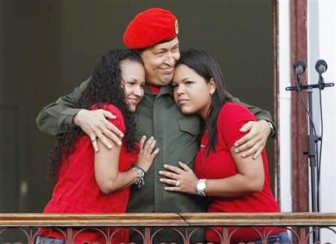CARACAS (Reuters) – Venezuela’s ever-theatrical President Hugo Chavez made a surprise homecoming yesterday after cancer surgery in Cuba, thrilling supporters with an emotional pledge to win the fight to regain his health.

His voice straining at times, Chavez told a crowd of thousands gathered outside the Miraflores presidential palace in Caracas he still needed strict medical treatment.
“Let nobody think my presence here today, July 4, means that we have won,” he said. “I swear that we will win the battle”.
But his own words suggested a battle for full recovery that could stretch his legendary stamina in the weeks ahead.
Interior Minister Tareck El Aissami said the president would have to follow a strict regime of rest and recuperation. “But that doesn’t mean that the revolutionary government’s actions will slacken,” El Aissami told reporters.
After an overnight flight home, Chavez, 56, rested during the day then appeared on the balcony where he has addressed the nation during some of the biggest moments of his rule, including after he survived a short-lived 2002 coup.
Chavez’s return changes the political dynamics once again in Venezuela, where politicians on all sides had been bracing for a protracted months-long absence of the man who has dominated the OPEC member nation since taking power in 1999.
“Long live life, long live Chavez!” the president, wearing a military uniform, told his delirious fans. He was strong enough to sing the national anthem and talk for 34 minutes.
Some supporters wept as Chavez recounted details of his operation in Cuba. “Those days were not easy,” he said.
The unpredictable, populist Chavez, who has nationalized vast swaths of the economy and led anti-US sentiment in Latin America, jetted in just in time for two days of celebrations of Venezuela’s 200th anniversary of independence from Spain.
“He wanted to prevent the situation from unravelling,” said analyst Michael Shifter. “The bicentennial was too compelling an occasion to miss. … It was politically irresistible.”
Before speaking from the balcony, Chavez waved a large Venezuelan flag and made the Christian sign of the cross.
With their “comandante” back on Venezuelan soil, elated supporters took to the streets of Caracas all day, chanting: “He’s back! He’s back!” and “Ooh! Aah! He’s here to stay!”
Many Venezuelans had thought Chavez’s convalescence after two operations last month in Cuba — one to remove a cancerous tumor — would keep him in Havana for weeks, possibly months.
“I’m fine. I feel well,” Chavez said upon arrival, singing a folk song and hugging ministers at the airport.
“I’m back at the epicenter of Bolivar,” he added, in reference to his idol, Simon Bolivar, a hero of South America’s fight for independence from Spanish rule.
Casting himself as Bolivar’s successor, Chavez’s government has during 12 years in power boosted state control over oil, restricted currency exchange and taken over companies ranging from cement makers to producers of glass bottles and toilets.
Despite euphoria among supporters, Chavez’s exact condition is unclear. He may still face lengthy treatment, throwing into question his ability to prepare for a 2012 re-election bid.
Chavez said his homecoming was “the start of the return,” implying to some he may keep a low profile in Venezuela or even return to Cuba for further cycles of treatment.
While not showing anything conclusive about his health, his return to Venezuela does address complaints from critics that Chavez was flouting the constitution and risking national security by ruling from a hospital in a foreign country.
Chavez’s return caught Venezuelans by surprise on the first of two days of holidays for today’s independence date.
“He’s looking a bit better. May God take care of him and cure him,” said 65-year-old pensioner Berxi de Chavez at the rally outside the presidential palace.
The drama around Chavez’s health has helped distract attention from problems that threaten to weaken his support among the country’s poorest, including frequent power outages, high crime and a growing shortage of affordable housing.
Polls show those concrete issues are weakening the appeal of his history-steeped nationalism, which frequently invokes the Latin American unity efforts of the 19th century.
“For a government to be able to rise from its ashes, it needs to improve the economic and social situation of the country,” said Antonio Ledezma, opposition mayor of Metropolitan Caracas and a virulent Chavez critic.
Still, opposition politicians have struggled to give a strong and united response to the Chavez health saga.
While clearly encouraged by prospects for their election campaign next year, they also do not want to be seen as exulting over his physical misfortune.
Chavez had been preparing for today’s celebrations for years. He even named a nationalized supermarket chain and group of banks “Bicentennial” last year in honor of the anniversary.
A military parade and street parties were planned.
Around Caracas, impromptu parties began among Chavez supporters, some picking up instruments and singing.
“He’s brought the soul back to our bodies, the smile back to our lives. Welcome home, Comandante!” said Mario Silva, a TV presenter known for his aggressive espousal of “Chavismo.”
Reaction among opposition supporters was more muted.
“He’s still sick. How can he rule Venezuela?” said one woman, a member of opposition party Democratic Action who asked not to be named “so the Chavistas don’t come for me.”









